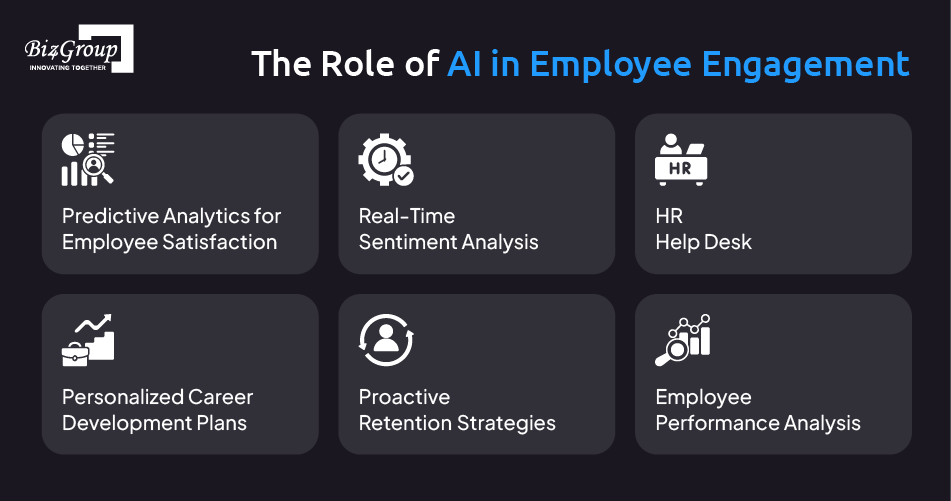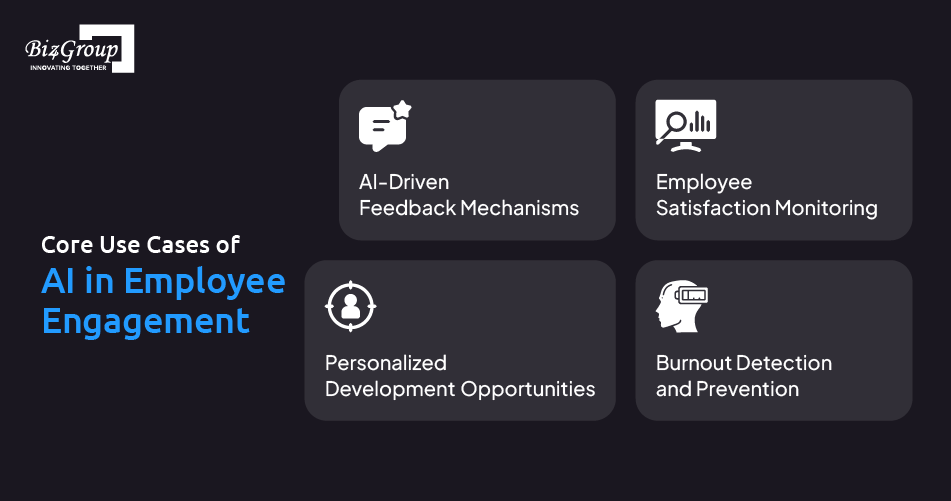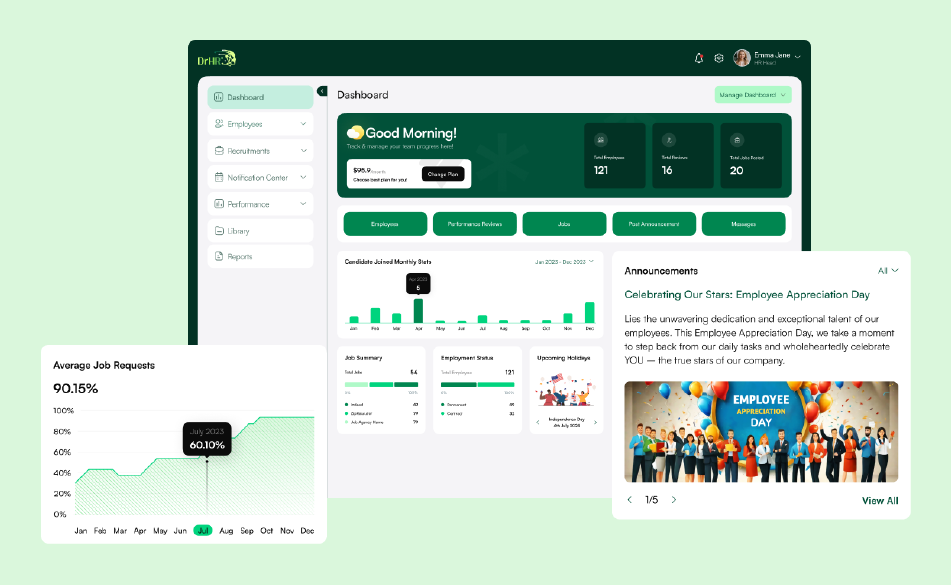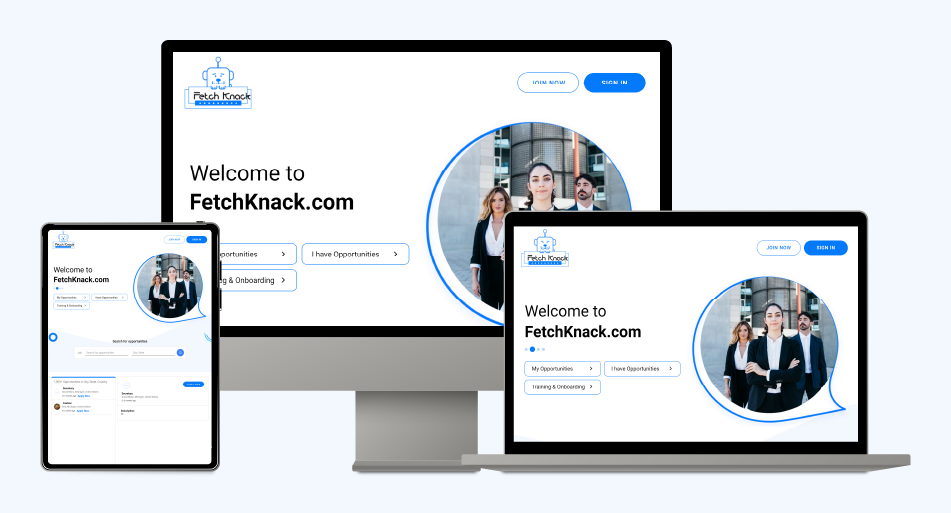Basic AI Chatbot Pricing: A simple chatbot that can answer questions about a product or service might cost around $10,000 to develop.
Read More
TL; DR

Role of AI in employee engagement: AI is already helping HR managers to improve feedback mechanisms, monitor employee satisfaction, personalize growth opportunities, detect burnouts and prevent them, and more.

Generative AI is getting popular in HR: 38% of HR managers are excited about implementing generative AI.

Ethical considerations: 77% of HR leaders are concerned about AI systems’ accuracy and verbosity. Hence, implementation needs to be well thought-out.
Imagine a world where AI not only knows how your employees are feeling but even more, predicts how they are going to feel tomorrow and helps you act today on it. This is the future of employee engagement.
AI-powered employee engagement tools are not just a bell and whistle, they are the future of how business approaches retaining their staff and keeping them happy. These data-driven tools provide predictive insights, real-time sentiment analysis, and even personalized career paths.
In fact, in a survey of 179 HR managers, Gartner found that 38% of HR managers are planning to implement generative AI or have already implemented it.
Being an AI software development company, we’ve built several AI modules to improve employee engagement and experience. All those experiments and innovations inspired us to write this piece on how AI is improving employee engagement for businesses.
So, let’s dive into the role of AI in employee engagement, highlight innovative use cases, showcase our expertise through past projects, and uncover the tangible business benefits of these transformative tools. Let’s rethink HR.
A 2023 report by Gallup found that 59% of employees are quiet quitting (not engaged), and 18% are loud quitting (actively disengaged).
Many organizations have employee engagement as the Achilles' heel. Skyrocketing turnover rates and eroding engagement scores are leaking talent—and cash—out of businesses. Did you know it can cost up to twice an employee's annual salary to replace them?
A report by Kincentric found that 49% of employees feel their employers are failing to provide the employee experience promised during joining.
Challenges abound:
Feedback Fatigue: Traditional feedback surveys are a chore and typically don’t lead to actionable follow-up.
One-Size-Fits-All Employee Development Plans: People are craving personalization, and most plans don’t cut it.
Burnout Blind Spots: There’s no way to manually detect burnout early like trying to find a needle in a haystack.
So, what's the silver lining? Enter human resource solutions powered by AI. Tools that measure employee satisfaction, gauge sentiment, and provide predictive insight are finally having the opportunity to close the engagement gap. So stay tuned to find out how AI is upending employee engagement from me and my panelists.
The increasing importance of AI in HR is due to its ability to elevate the employee experience without putting too much workload on the HR departments. Imagine an AI business assistant for your HR team—one that analyzes mountains of data, finds hidden patterns and turns insights into actions. And that’s what artificial intelligence brings to the table.

Here’s how AI is transforming employee engagement:
Predictive Analytics for Employee Satisfaction: Forget guesswork. AI analyzes past and present data to forecast employee sentiment. Think of it as a crystal ball for engagement trends.
Real-Time Sentiment Analysis: AI tools eavesdrop on employee communication: emails, chat messages, etc., to measure morale. It’s your 24/7 pulse on your workforce.
HR Help Desk: AI chatbots can assist employees in general queries. Companies interested in implementing AI-powered HR assistants can collaborate with a chatbot development company like Biz4Group to do this the best way possible.
Personalized Career Development Plans: Not all employees are the same, therefore the paths of their respective development don’t have to be either. AI focuses on growth opportunities that use one’s unique characteristics and desires.
Proactive Retention Strategies: Spot potential flight risks before they leave. With predictive insights, you can intervene with solutions that make employees want to stay.
Employee Performance Analysis: Using AI for employee performance management streamlines the process and promotes feedback transparency.

AI is a game changer for HR pros at its core. This isn’t about replacing humans, it’s about giving them superhuman capabilities. Wonder how this works in action? In the next section, let’s examine a few real-world examples.
Let’s get down to the nitty-gritty. How does AI enhance engagement? Here are the headline-worthy use cases:

Remember those clunky annual surveys? AI says goodbye to those dinosaurs. With real-time feedback systems, employees can share their thoughts in the moment. These systems analyze responses and provide actionable insights to HR teams—no more waiting a year to act on critical issues.
In our recent project of building an AI-powered HRMS solution (named DrHR), we integrated AI-driven feedback tools that collected and processed employee sentiment in real time. This armed HR teams with actionable data to improve engagement instantly.
AI doesn’t just monitor—it predicts. Using natural language processing and sentiment analysis, AI tools identify trends and warn of morale dips before they snowball into mass resignations.
Employees thrive when they feel seen. AI builds personalized growth paths by analyzing skills, career aspirations, and performance data. It’s like having a personal coach for every employee.
Burnout is sneaky, but AI is sneakier. By analyzing work patterns, AI flags overworked employees before burnout takes a toll. This gives HR teams time to step in with support measures.
These use cases are just the tip of the iceberg. With technologies like generative AI in HR, engagement becomes less guesswork and more science, setting the stage for happier employees and stronger organizations. Ready to see the ROI? Keep reading.
If you’re interested in knowing how chatbots are revolutionizing HR experiences, read this piece: 7 Interesting Use Cases of AI Chatbots in HR
AI-powered employee engagement tools don’t just make HR easier; they make businesses better. Let’s look at the benefits they deliver:
Boost Employee Productivity: Engaged employees are more focused and deliver higher-quality work. Employee experience AI tools help create the conditions for that focus.
Reduce Employee Turnover: Predictive analytics means fewer surprises—and fewer goodbyes. By using AI in employee experience, you can retain your top talent with proactive interventions.
Enhance Workplace Morale: Real-time insights enable HR to act quickly on issues, fostering a happier and more motivated workforce.
Streamlined Processes: Say goodbye to manual survey collation and hello to instant insights. AI saves HR teams countless hours.
Data-Driven Decisions: From hiring to retention strategies, AI ensures HR actions are backed by data, not hunches.
Personalized Engagement: When we meet people’s unique needs and aspirations, we build employees’ feeling of being valued.
Empowered Employees: With AI, employees have the tools and resources to take control of their growth and higher levels of satisfaction.
The Return on Investment of these tools isn’t in dollars—the real ROI is creating an environment where employees and companies grow together. In later sections, we will delve into some real-world results.
AI in employee engagement isn’t just theory—it’s happening. Here are two real-world examples from our portfolio that highlight the transformative power of AI:

The Challenge: The traditional HR processes consumed substantial amounts of time, lacked real-time insights, and merely amounted to ineffective engagement of the employees. Therefore, our client came to us with the idea of creating an AI HRMS that they could market as a SaaS product.
Our Solution: At Biz4Group, we thought up an AI-powered HRMS tool that incorporated real-time feedback mechanisms, sentiment analysis, and predictive analysis. This allowed HR teams to:
Monitor employee satisfaction dynamically.
Identify potential issues before they escalate.
Offer personalized career growth plans.
AI chatbot integration for HR helpdesk.
The Impact: The employee satisfaction scores increased by 30% and turnover rates reduced by 25%. Companies using DrHR are seeing a measurable boost in workforce morale and productivity.
Read more on how we built the solution: DrHR Portfolio

The Challenge: Job seekers were having difficulty finding job opportunities that catered to their skills, and employers were equally hampered by trying to engage potential candidates. The idea of the client was to construct a SaaS-based staffing solution that backs up the staffing companies to flow their business processes smoothly.
The Solution: FetchKnack utilized AI to offer:
The solution enjoys AI in remote staffing by offering tailored job recommendations based on user profiles and preferences.
Sentiment analysis of job postings to improve employer branding.
Engagement tools that fostered better communication between candidates and recruiters.
The Impact: A 40% increase in job application success rates and improved candidate-employer satisfaction. FetchKnack transformed how job seekers and providers connected.
Know more about how we built this solution: FetchKnack Portfolio
The Challenge: Employers and job seekers often face a disconnect due to generic matching algorithms and limited engagement features.
Our Solution: The YourCareerFair platform incorporated AI and ML to deliver:
Precise job matches based on skills, preferences, and historical data.
Enhanced communication tools to foster meaningful interactions between employers and candidates.
Real-time sentiment analysis to monitor satisfaction levels and improve user experience.
The Impact: Improved employer-employee matches by 50% and increased user engagement on the platform by 60%, setting new benchmarks for AI-driven job portals.
Read more on how we built YourCareerFair platform here: YourCareerFair Portfolio
These examples demonstrate that AI-powered tools aren’t just a luxury—they’re a necessity in today’s competitive landscape. Ready to see what’s next? Let’s look to the future.
From AI-powered job portals to employee engagement automation, the AI revolution in HR is just getting started. Here’s what the future holds for AI-powered employee engagement:
Tomorrow’s AI will go beyond suggesting employees' career paths—it will suggest specific learning modules and networking opportunities, and even career well-being programs that it will individualize to each employee’s preferences and goals. These AI-based employee training platforms are in trend and companies like us are integrating these systems into legacy HR software.
With advancements in API technology, AI platforms will integrate effortlessly into existing technology ecosystems, including HR systems, creating unified dashboards that offer real-time, actionable insights across multiple data sources.
AI won’t just focus on individual engagement; it will enhance team dynamics. By analyzing communication patterns and collaboration metrics, AI will help build stronger, more cohesive teams.
While AI is creating excitement and hype, 77% of HR leaders are concerned about the system's accuracy and verbosity. This concern makes ethical considerations critical for AI HR systems. Ensuring transparency, bias-free algorithms, and respect for employee privacy will be paramount.
Employee engagement is a bright future, and AI is going to play a big part in powering it. Those businesses willing to adapt to these trends will draw top talent while ensuring they have an environment where they thrive. Are you prepared to take the lead?

The opportunity is huge for HR tech startups to innovate and come up with brilliant and never-before-seen solutions. It has undeniable growth potential for investors. AI adoption in HR is no longer a competitive advantage, it’s a necessity for businesses.
Whether or not to embrace AI is no longer the question, the question is now how soon you can integrate AI into your efforts to power up your employees. The earlier you nip it in the bud, the faster you will unlock its ability to encourage happier, more engaged, and ultimately more productive workplaces.
If you want to learn more about AI implementations that are happening in the business world, feel free to explore the top AI case studies we’ve listed here: 10 Most Innovative AI Case Studies
with Biz4Group today!
Our website require some cookies to function properly. Read our privacy policy to know more.